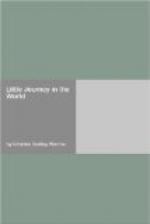“Yes, I am; I quite share Mr. Henderson’s feeling about it. I’m for the elevation of everything.”
“There is a capital chance for you,” said Henderson; “the university wants some scholarships.”
“And I’ve half a mind to found one—the Eschelle Scholarship of Washing and Clear-starching. You ought to have seen my clothes that came back to the car. Probably they were not done by your students. The things looked as if they had been dragged through the Cat-a-what-do-you-call-it River, and ironed with a pine chip.”
“Could you do them any better, with all your cultivation?” asked Margaret.
“I think I could, if I was obliged to. But I couldn’t get through that university, with all its ologies and laboratories and Greek and queer bottles and machines. You have neglected my education, Mr. Henderson.”
“It is not too late to begin now; you might see if you could pass the examination here. It is part of our plan gradually to elevate the whites,” said Henderson.
“Yes, I know; and did you see that some of the scholars had red hair and blue eyes, quite in the present style? And how nice the girls looked,” she rattled on; “and what a lot of intelligent faces, and how they kindled up when the president talked about the children of Israel in the wilderness forty years, and Caesar crossing the Rubicon! And you, sir” —she turned to the Englishman—“I’ve heard, were against all this emancipation during the war.”
“Bless my soul!” exclaimed Ponsonby, “we never were against emancipation, and wanted the best side to win.”
“You had a mighty queer way of showing it, then.”
“Well, honestly, Miss Eschelle, do you think the negroes are any better off?”
“You’d better ask them. My opinion is that everybody should do what he likes in this world.”
“Then what are you girding Mr. Henderson for about his university?”
“Because these philanthropists, like Mr. Henderson and Uncle Jerry Hollowell, are all building on top; putting on the frosting before the cake rises.”
“Haven’t you found out, Mr. Ponsonby,” Margaret interrupted, “that if there were eight sides to a question, Miss Eschelle would be on every one of them?”
“And right, too. There are eight sides to every question, and generally more. I think the negro question has a hundred. But there is only one side to Henderson Hall. It is a noble institution. I like to think about it, and Uncle Caesar Hollowell crossing the Rubicon in his theological seminary. It is all so beautiful!”
“You are a bad child,” said Margaret. “We should have left you at home.”
“No, not bad, dear; only confused with such a lot of good deeds in a naughty world.”
That this junketing party was deeply interested in the cause of education for whites or blacks, no one would have gathered from the conversation. Margaret felt that Carmen had exactly hit the motives of this sort of philanthropy, and she was both amused and provoked by the girl’s mockery. By force of old habit she defended, as well she might, these schools.




